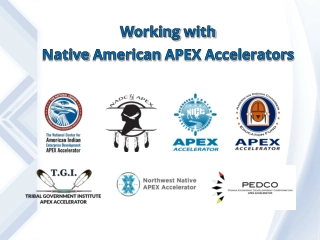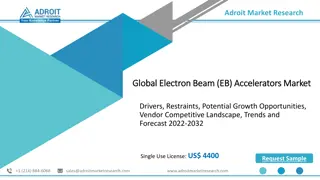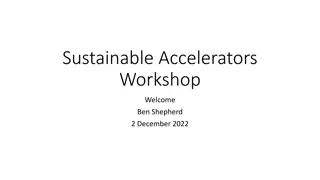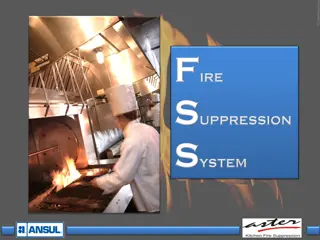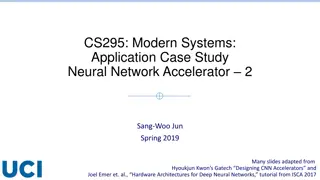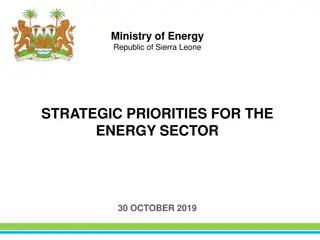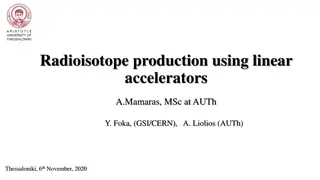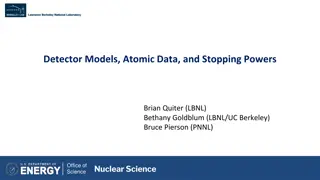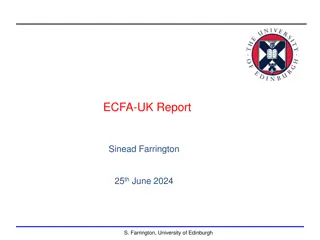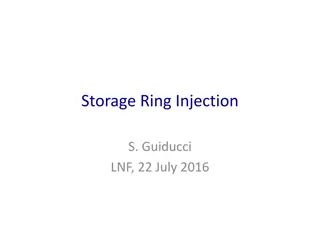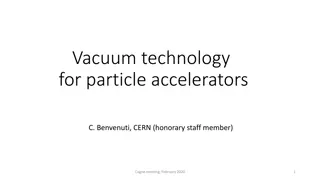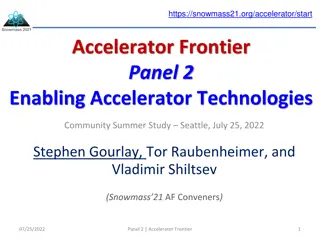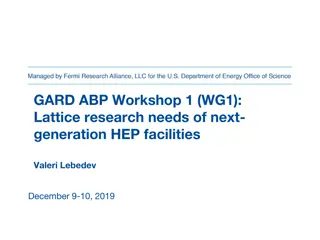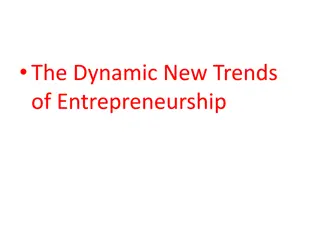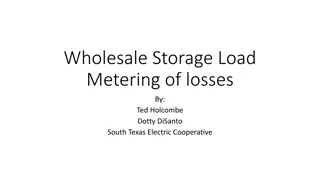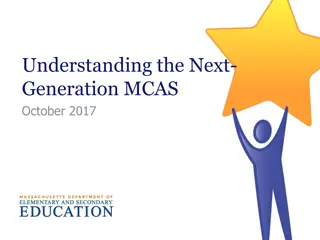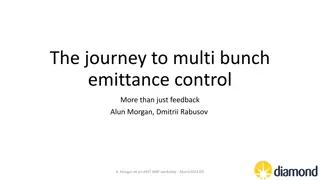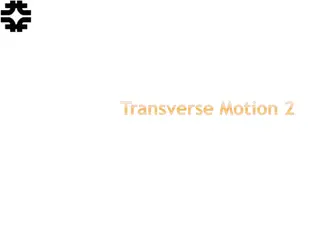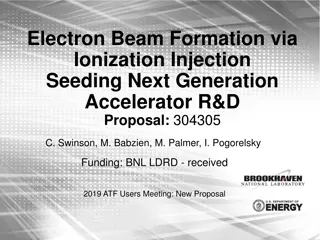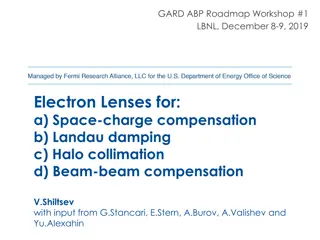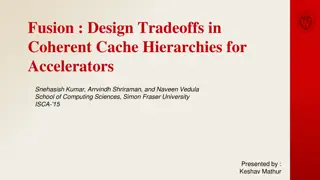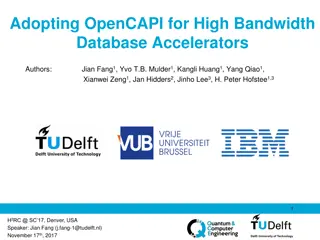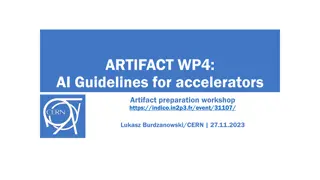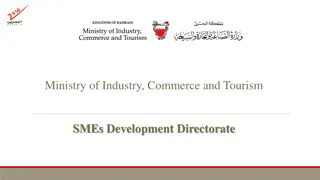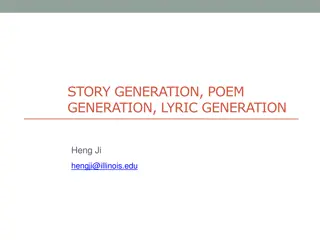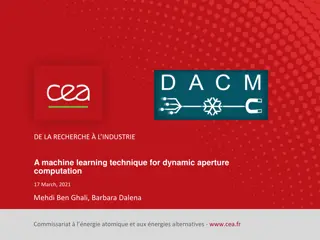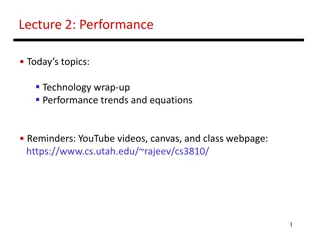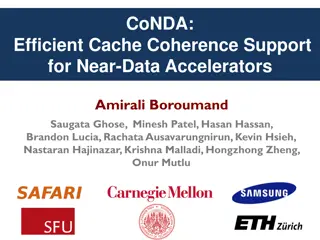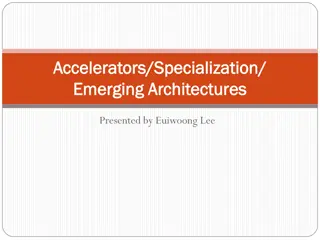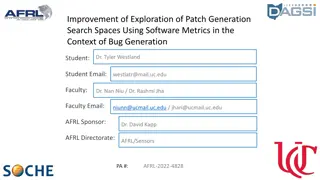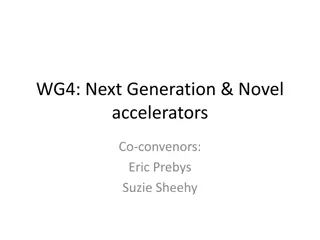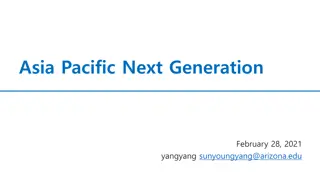Building a FAIR-Compliant Platform for AI-Ready Data in Particle Accelerators
This content discusses the development of a FAIR-compliant platform for AI-ready data in particle accelerators, highlighting the applications of machine learning in various accelerator facilities like CERN, PETRA-III, NSLS-II, HEPS, and more. It emphasizes the importance of high-quality data in acce
2 views • 25 slides
Native American APEX Accelerators Program Overview
The Native American APEX Accelerators Program, formerly known as PTACs, is a nationwide network of procurement professionals dedicated to assisting local businesses, including federally recognized Indian tribes and Alaska Native entities. Services are provided at no cost and aim to strengthen the de
1 views • 69 slides
Overview of Particle Accelerators and Isotope Production Methods
Explore various types of particle accelerators such as Direct Voltage Accelerators, Van de Graaff Generators, Tandem Van de Graaff Accelerators, and Linear Accelerators used in generating particles for isotope production, research, and industrial applications. These technologies play a crucial role
3 views • 22 slides
Electron Beam (EB) Accelerators Market Basic Information, Vendor Competition
Adroit Market Research has included the Global Electron Beam (EB) Accelerators Market\u00a0research to its database in order to provide a thorough analysis of the variables driving a general market growth trend
0 views • 5 slides
Sustainable Accelerators Workshop by ASTeC at STFC Daresbury Laboratory
ASTeC at STFC Daresbury Laboratory is hosting a workshop on improving the sustainability of particle accelerators, aiming to bring together scientists, engineers, and stakeholders to enhance current and future accelerator sustainability. The agenda includes discussions on reducing emissions, green t
0 views • 5 slides
Enhancing Information Retrieval with Augmented Generation Models
Augmented generation models, such as REALM and RAG, integrate retrieval and generation tasks to improve information retrieval processes. These models leverage background knowledge and language models to enhance recall and candidate generation. REALM focuses on concatenation and retrieval operations,
1 views • 9 slides
Comparison of 2nd vs 3rd Generation Fire Suppression Systems
The comparison highlights the evolution from 1st generation dry chemical agents to advanced 3rd generation systems like the Piranha Hybrid System, ensuring better fire protection in restaurants. It discusses the drawbacks of 2nd generation systems, emphasizing the need for improved fire suppression
1 views • 20 slides
Understanding the Need for Neural Network Accelerators in Modern Systems
Neural network accelerators are essential due to the computational demands of models like VGG-16, emphasizing the significance of convolution and fully connected layers. Spatial mapping of compute units highlights peak throughput, with memory access often becoming the bottleneck. Addressing over 300
0 views • 21 slides
Strategic Priorities for Sustainable Electricity Generation in Sierra Leone
The Ministry of Energy in Sierra Leone has outlined strategic priorities to ensure sustainable electricity generation and supply in the short, medium, and long term. Key actions include implementing an integrated electricity plan, identifying externally funded projects for power supply, and addressi
0 views • 19 slides
Next Generation Updates and Initiatives for 2022
The IMC Meeting 2021 highlighted the appointment of Surendran Muniandy as the Regional Chairperson for South East Asia, the brand identity project, and the 2022 work plan for engaging the Next Generation within CILT. The initiatives include a global mentoring programme, exploring opportunities in Eu
1 views • 7 slides
Advancements in Radioisotope Production Using Linear Accelerators for Medical Imaging
Exploring the potential of linear accelerators for producing radioisotopes used in PET imaging, this comprehensive study delves into the efficiency and cost-effectiveness of utilizing linac-based systems. Key considerations include accelerator designs, production yield estimations, and numerical cal
0 views • 12 slides
Nuclear Data Needs for Radiation Detectors and Accelerators
Explore the essential nuclear data needs for developing and interpreting radiation detectors and accelerators. This session focuses on traditional and novel detector technologies, including transport modeling, stopping powers, light yields, and X-ray emission. Meet the experts from top institutions
0 views • 13 slides
Overview of ECFA-UK: European Committee for Future Accelerators and its Activities
ECFA-UK, the European Committee for Future Accelerators, consists of members from prestigious institutions in the UK like Oxford, Edinburgh, Bristol, RAL, Glasgow, Cambridge, and UCL. The committee's main objective is to assess and ensure the well-being of the particle physics field in Europe and en
1 views • 11 slides
Understanding and Addressing Instability in Particle Accelerators
In this document, E. Shaposhnikova from CERN discusses observations and cures for instability in particle accelerators. The content covers types of instabilities, observations like direct and indirect effects, and possible cures such as modifying the source, passive and active damping, and changing
2 views • 30 slides
Comprehensive Overview of Sewage Treatment Plant Processes and Energy Generation
This seminar presentation dives deep into the world of sewage treatment plants, covering definitions, introduction, STP treatment stages (including primary, secondary, and tertiary treatments), energy generation through microbial fuel cells, and biogas generation. It emphasizes the importance of tre
0 views • 15 slides
Injection Process in Particle Accelerators
The injection process in particle accelerators involves transferring beams efficiently with minimal loss and emittance dilution. It includes on-axis injection onto the reference orbit using septum magnets and fast kickers to maintain beam trajectory accuracy. The design aims to achieve precise beam
0 views • 22 slides
Development of Attosecond Theory for Nobel Prize through Verilog Programming
Attosecond generation is a crucial technique for creating attosecond pulses by manipulating radiation waves. This research paper focuses on developing the Attosecond generation equation through Verilog programming and validating it using test programming techniques. The interface between equations,
0 views • 15 slides
McGill First Generation Orientation Event
The McGill First Generation Orientation event, organized by Campus Life & Engagement, took place on August 31st, 2021. The event highlighted the importance of supporting first-generation students and fostering allyship with Indigenous communities. It featured various sessions including introductions
0 views • 20 slides
Vacuum Technology for Particle Accelerators
This presentation covers the importance of vacuum technology in particle accelerators, focusing on particle loss due to collisions with residual gas molecules and the stringent vacuum requirements for storage rings and accelerators. It discusses the impact of circulating beams on vacuum deterioratio
0 views • 37 slides
Future of Accelerator Technologies: Enhancing Colliders and R&D Programs
The Accelerator Frontier Panel discusses the crucial components to enable future accelerators, emphasizing the need for a National Future Collider R&D Program, General Accelerator R&D, and adequate accelerator and test facilities. The message stresses the importance of an integrated future collider
0 views • 17 slides
Lattice Research Needs for Next-Generation HEP Facilities
Lattice research is vital for determining the characteristics of accelerators, colliders, and storage rings. High beam brightness is crucial for achieving goals like luminosity and beam loss reduction. The main barriers to higher beam brightness include instabilities and particle loss. General requi
0 views • 13 slides
Exploring Modern Entrepreneurship Trends: Incubators, Accelerators, and Opportunities
Discover the evolving landscape of entrepreneurship with a focus on business incubators and accelerators. Learn about their role in supporting startups, the difference between angel investors and incubators, and the benefits of engaging with these entities to elevate your entrepreneurial journey.
0 views • 47 slides
Wholesale Storage Load Metering of Losses in Distributed Generation Battery Facility
Example system configuration in ERCOT involving a wholesale storage load metering system to track losses in a distributed interconnected generation battery facility. The system includes electrical storage systems, generation resources, and distribution generation components. Challenges arise in dete
0 views • 8 slides
Overview of Next-Generation MCAS Assessment
The Next-Generation MCAS is an updated version of the previous assessment, focusing on critical thinking, application of knowledge, and preparing students for the next academic level or career. It is designed to be administered on computers and aims to eventually replace all older MCAS tests. The tr
0 views • 19 slides
Enhancing Emittance Control Strategies in Particle Accelerators
The journey to multi-bunch emittance control goes beyond mere feedback mechanisms, involving nuances like pinhole cameras as detectors and skew quadrupole magnets as actuators. This innovative approach aims to overcome limitations of existing systems like coupling control issues and hysteresis perfo
0 views • 16 slides
Understanding Transverse Motion in Particle Accelerators
Exploring the formalism and calculations related to transverse motion in particle accelerators, including the Hill equation, transfer matrices, lattice functions, and example drift calculations. The content delves into the mathematical foundations and practical applications of analyzing particle bea
0 views • 16 slides
Advancing Electron Beam Formation via Ionization Injection Seeding for Next-Generation Accelerators
Long-term R&D proposal outlines the development of an all-optical electron source at BNL using longer-wavelength lasers, aiming to characterize plasma wake profiles and advance laser wakefield acceleration. The project involves utilizing a 10-m laser, ionizing gas targets, and optimizing laser pulse
0 views • 9 slides
Electron Lenses in Particle Accelerators: Advancements and Applications
Explore the use of electron lenses in particle accelerators for space-charge compensation, Landau damping, halo collimation, and beam-beam compensation. Learn about their history, applications in Tevatron and RHIC colliders, and current research areas. Electron lenses have shown promise in enhancing
0 views • 44 slides
Tradeoffs in Coherent Cache Hierarchies for Accelerators
Explore the design tradeoffs and implementation details of coherent cache hierarchies for accelerators in the context of specialized hardware. The presentation covers motivation, proposed design, evaluation methods, results, and conclusions, highlighting the need for accelerators and considerations
0 views • 22 slides
Enhancing Database Accelerators with OpenCAPI Technology
Explore how OpenCAPI is revolutionizing database accelerators by enabling high bandwidth connections, improving data movement speeds, reducing latency, and enhancing memory scalability. The adoption of OpenCAPI in conjunction with FPGA technology promises significant performance boosts for computati
0 views • 13 slides
AI Guidelines for Accelerators: Workshop Summary
Workshop summary on AI guidelines for accelerators focusing on achieving interoperability, leveraging AI solutions, and enabling accelerators to function as autonomous machines. The document contains principles and work breakdown for developing functional guidelines applicable to various domains bey
0 views • 10 slides
Overview of SMEs Development and Business Incubation
This content presents information on the Ministry of Industry, Commerce, and Tourism SMEs Development Directorate, definitions of SMEs, characteristics of entrepreneurs, incubation management systems, definitions of incubators and accelerators, services provided by business incubators/accelerators,
0 views • 13 slides
Advancements in Text Generation and Comprehension Modeling
Cutting-edge research in coherent story generation, surface realization models, story ending generation, and animation generation is showcased. The models produce distribution over vocabulary and next token prediction for generating text and handling complex sentences seamlessly.
0 views • 40 slides
Machine Learning Technique for Dynamic Aperture Computation in Circular Accelerators
This research presents a machine learning approach for computing the dynamic aperture of circular accelerators, crucial for ensuring stable particle motion. The study explores the use of Echo-state Networks, specifically Linear Readout and LSTM variations, to predict particle behavior in accelerator
0 views • 17 slides
Performance Trends and Challenges in Modern Computing
Three key roadblocks hindering performance improvements in modern computing include power constraints, stagnant technology scaling, and limited innovation in complex ideas. The historical contributions to performance show that better processes, circuits, and organization have driven advancements, bu
0 views • 17 slides
Optimizing Coherence Mechanisms for Near-Data Accelerators
Coherence mechanisms play a crucial role in supporting efficient communication between Near-Data Accelerators (NDAs) and CPUs. The CoNDA framework introduces an optimistic approach to coherence, aiming to reduce unnecessary off-chip data movement and enhance performance. By gaining insights before c
0 views • 55 slides
Exploring Accelerators and Emerging Architectures in Specialized Computing
Delve into the world of accelerators and specialized computing architectures with a focus on application-specific designs like GPUs and FPGAs. Discover the challenges of performance efficiency and generality in the Iron Triangle paradigm, alongside innovative solutions presented in recent research p
0 views • 61 slides
Exploration of Patch Generation Search Spaces using Software Metrics
This research focuses on improving the exploration of patch generation search spaces by utilizing software metrics in the context of bug generation. The study investigates the threat of malicious code insertion in third-party code construction for military projects and explores the concept of Patch
0 views • 8 slides
Innovative Next-Generation Accelerator Technologies Conference
Explore cutting-edge accelerator technologies at the WG4 Next Generation & Novel Accelerators conference, led by Co-convenors Eric Prebys and Suzie Sheehy. Dive into sessions covering advancements in accelerator science, with detailed insights shared in WG Sessions 1 to 5. Uncover the future of acce
0 views • 6 slides
Advancing Next-Generation Leadership in Asia Pacific
Focused on rebuilding and fostering the development of next-generation digital leaders in Asia and beyond, the Asia Pacific Next Generation initiative aims to positively influence career paths, promote intergenerational mentorship, and support UN Sustainable Development Goals. Through Think Tank act
0 views • 14 slides

